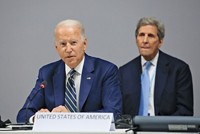Advertisement
Grab your lab coat. Let's get started
Welcome!
Welcome!
Create an account below to get 6 C&EN articles per month, receive newsletters and more - all free.
It seems this is your first time logging in online. Please enter the following information to continue.
As an ACS member you automatically get access to this site. All we need is few more details to create your reading experience.
Not you? Sign in with a different account.
Not you? Sign in with a different account.
ERROR 1
ERROR 1
ERROR 2
ERROR 2
ERROR 2
ERROR 2
ERROR 2
Password and Confirm password must match.
If you have an ACS member number, please enter it here so we can link this account to your membership. (optional)
ERROR 2
ACS values your privacy. By submitting your information, you are gaining access to C&EN and subscribing to our weekly newsletter. We use the information you provide to make your reading experience better, and we will never sell your data to third party members.
Environment
Curbing Climate Change
Environment: International initiative seeks to reduce emissions of methane, black carbon, and HFCs
by Cheryl Hogue
February 20, 2012
| A version of this story appeared in
Volume 90, Issue 8
A global initiative launched last week aims to slash emissions of three short-lived pollutants that contribute to global warming: methane, black carbon, and hydrofluorocarbons (HFCs).
By reducing emissions of these pollutants, the world can significantly reduce the amount of human-caused climate change that is expected by 2050, said U.S. Secretary of State Hillary Rodham Clinton, who announced the new effort on Feb. 16. These three pollutants stay in the atmosphere for a relatively short time—from days to decades—compared with up to centuries for carbon dioxide, the main greenhouse house produced through human activities.
Controlling these short-lived pollutants has other significant benefits in addition to reducing climate impacts, Clinton stressed. “They also destroy millions of tons of crops every year and wreak havoc on people’s health,” she said. Black carbon is a component of particulate pollution linked to respiratory and cardiovascular problems. Methane contributes to ground-level ozone, which can cause health problems and reduce crop yields.
The international coalition, called Climate & Clean Air Coalition To Reduce Short-Lived Climate Pollutants, includes the U.S., Bangladesh, Canada, Ghana, Mexico, Sweden, and the United Nations Environment Programme (UNEP). It intends to help governments adopt policies that reduce emissions of these pollutants. Efforts to control black carbon include replacing inefficient cooking stoves, adopting emission standards for diesel-fueled vehicles, and ceasing the burning of crop residues. Actions to curb methane emissions include capturing the gas seeping from coal mines and reducing or eliminating the practice of venting or flaring at natural gas or petroleum operations.
HFCs were developed as replacements for chlorofluorocarbons, which erode Earth’s protective stratospheric ozone layer. Potential actions to control HFC emissions include reduction of leaks in equipment that uses these chemicals and demonstrations of technology that uses more environmentally benign refrigerants.
Clinton warned that the new coalition would not replace efforts to ratchet down CO2 emissions. “This coalition is intended to complement, not supplant, the other actions we are and must be taking” to combat climate change, Clinton said.
The effort “is buying us back some time we’ve already lost” to reduce greenhouse gas emissions, said Achim Steiner, executive director of UNEP.
Initially, under the plan, the U.S. will chip in $12 million to the initiative over the next two years, and Canada will pony up $3 million. More contributions are expected from other countries.






Join the conversation
Contact the reporter
Submit a Letter to the Editor for publication
Engage with us on Twitter